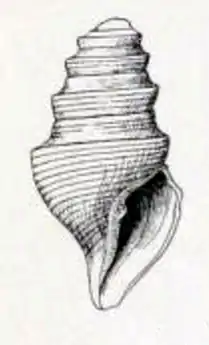Borsonella hooveri
Borsonella hooveri is an extinct species of sea snail, a marine gastropod mollusk in the family Borsoniidae.[1]
| Borsonella hooveri | |
|---|---|
 | |
| Drawing of a shell of Borsonella hooveri | |
| Scientific classification | |
| Domain: | Eukaryota |
| Kingdom: | Animalia |
| Phylum: | Mollusca |
| Class: | Gastropoda |
| Subclass: | Caenogastropoda |
| Order: | Neogastropoda |
| Superfamily: | Conoidea |
| Family: | Borsoniidae |
| Genus: | Borsonella |
| Species: | B. hooveri |
| Binomial name | |
| Borsonella hooveri (Arnold, 1903) | |
| Synonyms[1] | |
| |
Description
The length of the (decollate) shell, 14.7 mm ; of body whorl, 10 mm; of aperture, 7–5 mm ; max. diam. 8 mm.
The small shell is chalky-white, covered with a polished olive-gray periostracum. The apex is eroded, leaving indications of about six whorls. The general form of the shell is biconic with a single sharp keel at the shoulder, between which and the suture the whorl is more or less excavated. The suture is distinct, the margin in front of it is turgid, giving an effect as if minutely channelled. The excavated area forming the anal fasciole shows arcuate growth lines, crossed by about six faint incised distant spiral lines. The keel somewhat above the periphery, shows a rounded and somewhat compressed edge without waves or nodulations. The surface in front of the keel is moderately convex, spirally sculptured by obsolete distant lines crossed by fine irregular slightly elevated incremental lines, which, in spots, produce a vermiculate aspect. The base of the shell is a little constricted behind the short, nearly straight, attenuated cana. The; body shows a wash of callus. The outer lip has a wide, moderately deep, rounded anal sulcus. In front of the keel it is markedly protractive, thin and simple. The columella is straight, moderately callous, with a single strong almost horizontal plait near its insertion, anteriorly obliquely truncate, twisted, not pervious. The siphonal canal is very short.[2]
Distribution
This fossil species occurs in the Pleistocene of San Pedro, California.
References
- Bouchet, P. (2015). Borsonella hooveri (Arnold, 1903). In: MolluscaBase (2015). Accessed through: World Register of Marine Species at http://www.marinespecies.org/aphia.php?p=taxdetails&id=849191 on 2016-02-24
- W.H. Dall (1908): Reports on the Dredging Operations off the West Coast of Central America to the Galapagos, to the West Coast of Mexico, and in the Gulf of California, in charge of Alexander Agassiz, carried on by the U. S. Fish Commission Steamer "Albatross," during 1891, Lieut. Commander Z. L. Tanner, U. S. N., Commanding. XXX VII. Reports on the Scientific Results of the Expedition to the Eastern Tropical Pacific, in charge of Alexander Agassiz, by the U. S. Fish Commission Steamer "Albatross," from October, 1904, to March, 1905, Lieut. Commander L. M. Garrett, U. S. N., Commanding. XIV. The Mollusca and the Brachiopoda; Bulletin of the Museum of Comparative Zoology at Harvard v. 43 p. 276 (1904)
- Arnold, Mem. Cal. Acad. Sci., 1903, 3, p. 201, pl. 10,
- McLean J.H. (1996). The Prosobranchia. In: Taxonomic Atlas of the Benthic Fauna of the Santa Maria Basin and Western Santa Barbara Channel. The Mollusca Part 2 – The Gastropoda. Santa Barbara Museum of Natural History. volume 9: 1–160